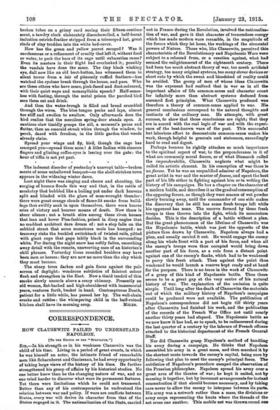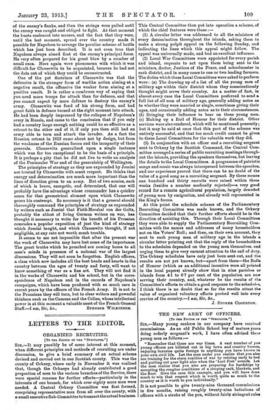CORRESPONDENCE.
ROW cuarsEwrrz FAILED TO UNDERSTAND NAPOLEON.
[To =a Emirs or sag .firscrsnos.'n
Ste,—In his strength as in his weakness Clausewitz was the child of his time. Living in a period of great events, in which be was himself an actor, the intimate friend of remarkable men like Scharnhorst and Gneisenau, he had every opportunity of taking large views of the history of his time. He further strengthened his grasp of affairs by his historical studies. No one better knew than he the changing nature of war, and no one tried harder to discover what were its permanent features. Yet there were limitations which he could not transcend. Better than any of his contemporaries he understood the relation between war and policy. If ware are conflicts between States, every war will derive its character from that of the States engaged in it. The nationalization of the State, carried out in France during the Revolution, involved the nationalisa- tion of war, and gave it that character of tremendous energy which has made modern wars resemble, in the magnitude of the forces which they let loose, the workings of the elemental powers of Nature. Those who, like Clausewitz, perceived this characteristic of the Revolutionary and Napoleonic Wars were subject to a rebound from, or a reaction against, what had seemed the enlightenment of the eighteenth century. There had been too much abstract theory of war, too much artificial strategy, too many original systems, too many clever devices or short cuts by which the sweat and bloodshed of reality could be avoided. The group of men of whose ideas Clausewita was the exponent had realized that in war as in all the important affairs of life common-sense and character count for infinitely more than abstract systems deduced from assumed first principles. What Clausewitz produced was therefore a theory of common-sense applied to war. His general conclusions correspond to the natural thoughts and instincts of the ordinary man. He attempts, with great coerces, to show that those conclusions are right; that they are in accord with the real logic of war and with the experi- ence of the best-known wars of the past. This 'successful but laborious effort to demonstrate common-sense makes his work, though helpful to generals and statesmen, exceedingly hard to read and digest.
Perhaps because he rightly attaches so much importance to the spiritual aspect of war, to the preponderance in it of what are commonly moral forces, or of what Bismarck called the imponderabdia, Clausewitz neglects what might be called its artistic element. In his conception of war there is no finesse. Yet he was an unqualified admirer of Napoleon, the great artist in war and the master of finesse, and spent the best part of his life either in fighting against him or in writing the history of his campaigns. He has a chapter on the character of a modern battle, and describes- it as the gradual consumption of the opposing forces, as though they were masses of wet powder slowly burning away, until the commander of one side makes the discovery that he still has some fresh troops left while his opponent has none. The reserve formed by these fresh troops is then thrown into the fight, which its momentum decides. This is the description of a battle without a plan. But the great phenomenon of the lifetime of Clausewitz was the Napoleonic battle, which was just the opposite of the picture thus drawn by Clausewitz. Napoleon always bad a plan, and usually carried it out. He would engage the enemy along his whole front with a part of his force, and when all the enemy's troops were thus occupied would bring down another part of his force, as a rule from a distant point against one of the enemy's flanks, which had to be weakened to parry this fresh attack. Then against the point thus weakened he would launch a reserve kept ready and at hand for the purpose. There is no trace in the work of Clausewitz of a grasp of this kind of Napoleonic battle. Thus there seems to be a great gap at the very centre of his natural history of war. The explanation of the omission is quite simple. Until long after the death of Clansewitz the materials out of which the military history of Napoleon's campaigns could be produced were not available. The publication of Napoleon's correspondence did not begin till thirty years after Clansewitz had finished his work, and the publication of the records of the French War Office not until nearly another thirty years had elapsed. The Napoleonic battle as we now know it has had, so to speak, to be rediscovered during the last quarter of a century by the labours of French officers attached to the historical department of the French General Staff.
Nor did Clausewitz grasp Napoleon's method of handling his army during a campaign. He thinks that Napoleon assembled his army in a great mese, and then marched it by the shortest route towards the enemy's capital, being sure by following that plan to meet the enemy's principal force. The subtleties of Napoleon's procedure escaped the observation of the Prussian philosopher. Napoleon spread his army over a great area of the theatre of war ; he kept it united, not by massing it together, but by incessant arrangements for instant concentration if that should become necessary, and by taking care never to allow the enemy to interpose between its parte. His army was a network rather than a mass, the divisions or army corps representing the knots where the threads of the net cross one another. This mobile net was thrown round one
of the enemy's flanks, and then the strings were pulled until the enemy wee caught and obliged to fight. At that moment the knots coalesced into masses, and the fact that they were, until the last moment, spread over the country made it possible for Napoleon to arrange the peculiar scheme of battle which has just been described. It is not even true that Napoleon always aimed first at the enemy's principal force. He very often prepared for his great blow by a number of small ones. Here again were phenomena with which it was difficult for Clausewitz to be acquainted, because he had not the data out of which they could be reconstructed.
One of the pet doctrines of Clausewitz was that the defensive is the stronger form of warlike action aiming at a negative result, the offensive the weaker form aiming at a positive result. It is rather a cumbrous way of saying that you need more troops for attack than for defence, and that you cannot expect by mere defence to destroy the enemy's army. Olausewitz was fond of his strong form, and had great faith in defence turned at the right moment into attack. He had been deeply impressed by the collapse of Napoleon's army in Russia, and came to the conclusion that if you only had a country large enough nothing could be so effective as a retreat to the other end of it, if only you then still had an army able to torn and attack the invader. As a fact the Russian retreat in 1812 came about not by design, but from the weakness of the Russian forces and the incapacity of their generals. 01ausewitz generalized upon a single instance which was far too exceptional to be the basis of a principle. It is perhaps a pity that he did not live to write an analysis of the Peninsular War and of the generalship of Wellington.
The principles of strategy as they are expounded by Jomini are treated by Clausewitz with scant respect. He thinks that energy and determination are much more important than the lines of direction given to an army. But of two armies, each of which is brave, energetic, and determined, that one will probably have the advantage whose commander has a quicker sense for that geometrical clement upon which Clausewitz pours his contempt. So necessary is it that a general should thoroughly command the principles of strategy as expounded by writers such as Jomini that Field-Marshal von der Colts, probably the ablest of living German writers on war, has thought it necessary to write for the benefit of his Prussian comrades a popular exposition of just the kind of strategy which Jomini taught, and which Clausewitz thought, if not negligible, at any rate not worth much trouble.
It seems to me not impossible that after the present war the work of Clausewitz may have lost some of its importance. The great truths which he preached are coming home to all men's minds in presence of a national war of the largest dimensions. They will not soon be forgotten. English officers, a class which now includes all the beat heads and hearts in the country between the ages of twenty and forty, will want to know something of war as a fine art. They will not find it in the works of Clausewitz and his school, but in the corre- spondence of Napoleon and in the records of Napoleon's campaigns, which have been produced with so much care in recent years by the officers of the French Army. It is not to the Prussians they will turn, but to clear writers and powerful thinkers such as the Camons and the Colitis, whose intellectual power is at this moment a valuable asset of the French General



































 Previous page
Previous page